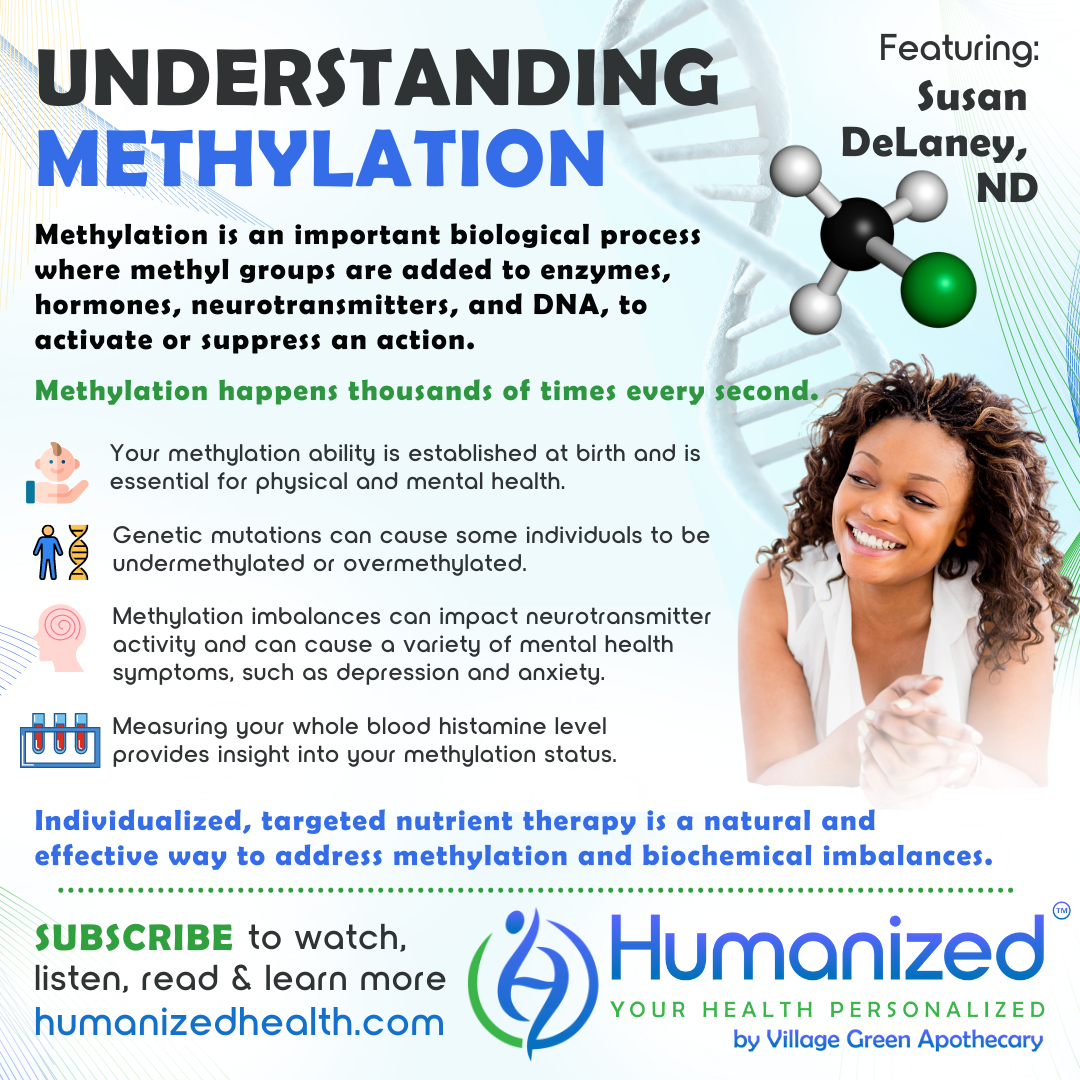Understanding Methylation
Featuring
Susan DeLaney, ND, RN
WATCH
LISTEN
READ
Rebekah Kelley: Welcome to the Humanized podcast, all about personalizing your health. I’m your host, Rebekah Kelley and today our topic will be Understanding Methylation, with Dr. Susan DeLaney. Before I introduce Dr. DeLaney, I want to remind everyone to subscribe and get all the other variety of casts in audio, video and transcription at HumanizedHealth.com. I’d also like to thank our sponsor, Village Green Apothecary, at MyVillageGreen.com.
A little bit about Dr. Susan DeLaney. She has practiced naturopathic medicine in North Carolina for over three decades. Over the years, she’s observed that the health of many people, including children, has greatly declined while the number of prescriptions has dramatically increased. By using a natural approach to healing, she’s able to help people become less dependent on prescription drugs and improve their health and vitality. In her practice, as well as in her lectures, Dr. DeLaney inspires people using up-to-the-date nutrition science to take personal responsibility for their own health journey. Dr. DeLaney is passionate about educating individuals and their health care providers about the benefits of advanced nutrient therapy for balancing biochemistry, as well as the nutritional value of eating real food and healthy fats. Dr. DeLaney’s latest project, Your Health is No Big Thing: It’s a Million Little Things, provides links to 13 educational videos to help people learn more about healthy fats, the importance of fat soluble vitamins, as well as simple changes individuals can do to improve their health.
Dr. DeLaney, thanks for being with us today.
Susan DeLaney: Thanks for having me.
Rebekah Kelley: It’s always a pleasure and I’m very excited to hear about methylation. So, what is it?
Susan DeLaney: So, first of all, let’s talk about what is a methyl group. Break it down simply. So it’s one carbon and three hydrogens, and they’re just bound together. And that is all a methyl group is. But, it’s again, carbon, three hydrogens. And we want to think of methylation as a process that your body is using to get things done. There’s thousands of ways it gets things done, but methylation is one of them. And so the way I tell my clients about it is that, think of a methyl group like a Euro or a dollar. And you use that methyl group to do something or to not do something, suppress that action.
So methylation is taking place thousands of times per second in your body. And so it happens in all arenas, not just in the arena of mental health. But why methylation is important in mental health is because when you are born, you have markers that are laid down for methylation to be normally methylated, overly methylated or undermethylated. And so some of that is inherited from your parents. So that’s where the genetic thing comes up, and that is established at birth. So there’s nothing you can do necessarily to change that, but you can modify if it creates problems for you in the realm of mental health.
So Dr. Walsh says that 70% of the people are normally methylated, 22% of the population is undermethylated, and 8% of the population is overmethylated. And in his protocol, he uses a test called whole blood histamine. And make sure you say whole blood, because it’s different from the other tests that you measure histamine for allergies or certain food things that happen to people. So whole blood histamine turns out to be a marker for methylation because it is degraded by methyl groups. So if you have a lot of methyl groups, then you have a low histamine level; that person would be overmethylated. Pretty simple. If you have very few methyl groups, this person’s histamine is going to be high because they can’t degrade it, so therefore you’re under methylated. And that is why this blood test is used.
So in some genetic testing, people say, well, I have this gene, therefore I am folate deficient, I need methylfolate and MTHFR. And actually you have a lot of genes that may make you more overmethylated and some undermethylated. But when you look at the histamine level, it is the sum total of a lot of those different genes on different sides. This is not determined by one set of genes. It’s the summation of a set of genes on either side, and he describes it like it’s a tug of war going back and forth. And if you have more undermethylated genes, that side is going to win. So it’s a combination of things that happens.
Rebekah Kelley: Wow. So you kind of gave us a little bit of primer for this, because you mentioned high or low histamine, but how do you know which one you are, over, under or normal? Like what are the tags or what can someone be like, oh, that sounds like me.
Susan DeLaney: Yeah. It’s not a genetic test, it is through the whole blood histamine testing that Dr. Walsh has recommended, and it’s done through DHA Labs – you can do it through Quest, but Lab Corp is the one that does it the best. So that test will tell you if you’re over, under or normally methylated. And so what’s interesting about this is each methylation, over and under, has a symptom picture to go along with it. So if you’re undermethylated, which sounds like a bad thing, but it actually turns out to be a good thing because these people are driven, they want to do well in school, they want to be the valedictorian, do the best they can. They’re competitive in sports. And yet, they can be OCD. They can have a lot of depression and anxiety. In fact, all of the imbalances that we’ll eventually talk about can have anxiety and depression, any of that thing, but we’re looking at the total symptom picture. So these are people that are high achievers and Dr. Walsh says, oh, about 90% of the doctors in his classroom are undermethylators – and he’s right about that because you’re driven, you’re competitive, you want to know this. Yes. But it doesn’t mean that. I mean, you can be an undermethylator and not have symptoms of this, as well. So you don’t have to just treat methylation only if you’re depressed, anxious and having difficulty in your life. I have a sister who’s severely undermethylated, but she has ADHD and it just works for her, you know? She just gets a lot done, juggles a lot of balls, sometimes they crash, but you can be undermethylated and it works.
So on the other side, maybe some of you know people like this, an overmethylated person, they’re so much fun. They’re laughing. They want to be friends. They’re great neighbors. They don’t really care about school that much. They get a, B, C, that’s kind of okay. They like sports, but they don’t want to play to win. They want to play to have fun and be with other people. They can also tend to be a little bit more artistic, have some musical abilities. And again, you can be overmethylated and function well, but many of the people that I have tested who are overmethylated tend to have problems in school. Like they try really hard and they’re working harder than most people, but they just can’t get it. But I think they have ADHD. Overmethylation can cause that, as well. And so can a high copper. Overmethylation is associated with a high copper, as well. So sometimes there’s not just one imbalance, there’s two or three. But the two methylation imbalance, overmethylation and undermethylation, they look distinctly different. Most of the time.
So I’ll tell you one story. I had a physician who came in, she was a psychiatrist and she said, I want you to test me for the Walsh protocol. I said, sure. And it turns out she is overmethylated. And you know, she’s a doctor, she went to med schools. She’s got to be pretty highly competitive to get through all that. So I called her and said, Dr. Jones – that’s a fake name – I said, you know, I think the test is wrong. We need to retest you because you don’t seem to fit the symptom picture of the blood tests, and maybe something went wrong in the lab. And she goes, oh no, I read the book. Overmethylation fits me perfectly. And so, wow. I was very surprised. Most of the time you can see it exactly. And maybe she hadn’t totally revealed her symptoms to me. She just had problems focusing and whatnot.
So Dr. Walsh says the testing is important, it’s 50% of it, as well as the symptom picture, the protocol, I mean, what that person is experiencing. And some people function okay as undermethylators and some as overmethylators, but I really feel like the overmethylators struggle. They really do struggle – keeping up in school, and feeling like there’s something wrong with them, and acting out behavior, those kids. So it’s fascinating. But it’s rare to find an overmethylator, I’ve probably had 15 or so in my practice in the last 8 or 9 years. But they respond so well to the treatment. It’s really remarkable.
Rebekah Kelley: Wow. It’s almost like, you know, before you hire a tutor for your child, because they’re struggling, you might also want to order some biochemistry testing to go along with it and see whether you can get them the right nutritional support to help with that. Wow.
Susan DeLaney: Exactly. And there are psychiatrists all over the country doing this and you can find them on Dr. Walsh’s website, WalshInstitute.org. And I would also like to say to parents, if your child is having emotional difficulties, acting out, behavior problems – number one, it’s not because you’re a bad parents. And it’s not because they’re bad kids. It could be their biochemistry is just out of bounds. And before you put them on drugs, let’s test that and see if there’s something that we can do. It’s so rewarding to see a kid going from being ostracized, can’t keep up at school, to now he’s in high school, playing basketball and getting good grades. And that was not because of drugs. We’re not having a deficiency of Prozac in this country. It is not the reason that children are acting out, depressed and whatnot. So there’s much more to it, underlying biochemistry. So like I said, let’s go to the headwaters, find out what’s going on.
Rebekah Kelley: I love that. Thank you, Dr. DeLaney, those are really valuable insights Dr. DeLaney can be found at www.TheWellnessAlliance.com. I’m going to spell that. It’s T H E W E L L N E S S A L L I A N C E.com. And let me remind you to subscribe and get access to all Humanized videos, podcasts and transcriptions from all of our thought leaders on personalized health at HumanizedHealth.com. Thank you so much for being with us, Dr. DeLaney.
Susan DeLaney: Oh, you’re so welcome. Truly insightful.









